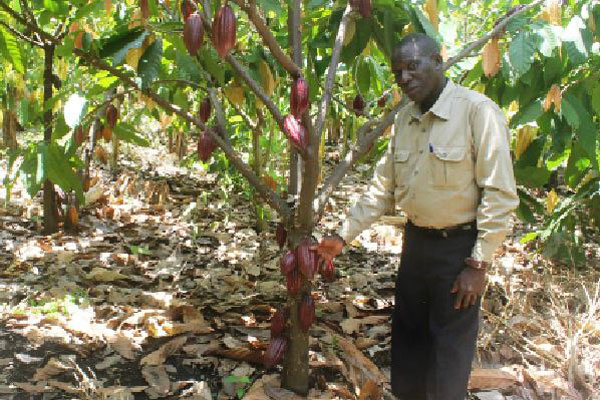Regardless of your salary endeavour to save - Aineah

Content after formal work. Aineah Aineah Sikabyaholo at his cocoa garden. Photo | Alex Ashaba
What you need to know:
- Happy businessman. Aineah Sikabyaholo, 66, does not regret life in retirement, writes Alex Ashaba.
Aineah Sikabyaholo, 66, is a prosperous maize and cocoa farmer in Kakoga Cell, Karugutu Town Council in Ntoroko District.
The retired parish chief found passion in agriculture, saying it was his childhood dream to become an agriculturalist which persisted even after retirement.
In 1976 after attaining East Africa Certificate of Education from Sir Tito Winyi Secondary School in Hoima District, Sikabyaholo applied for the position of assistant livestock marketing officer in public service.
“After school, I applied for the job, sat interviews and I got the job because at that time people who had completed O-Level were few and they had high chances of being employed by the government,” he recalls.
His first posting was in the Rwenzori region, the current Kasese District where he worked up to 1982. His role was to collect revenue from cattle markets and also check the movement permits of animals. He says at that time people smuggled animals to Congo through Bwera.
Then, he was transferred to Kabarole District and posted to the main station in Kahunge in the current Kamwenge District where he was in charge of animal markets including Rwamwanja, Rukunyu, Kabuga, Kichwamba and Kitagwenda up to 1990.
Sikabyaholo’s first salary was Shs505 which he says was very little but says he tried as much to ensure that he used it to buy land.
While in Kabarole District in the late 1990s, cattle markets were closed due to the outbreak of foot and mouth disease which made him abandon his duty station for six months and he went for private business. He consequently lost his job because this.
“I spent about six months buying and selling coffee from Bundibuyo to Kasese but at the end of the sixth month when I went to the bank for my salary I was told that I had abandoned duty and I was no longer a government employee,” Sikabyaholo recalls.
Private work and opportunities
After losing the public service job, he carried on with his private business and joined agriculture.
In 1990, he became a purchasing officer at Butorya Agencies in Kasese, a private entity that bought coffee from farmers up to 1998.
With the assistance of the resident district commissioner of Bundibugyo, he was recruited to attend a cadre course at Kyankwanzi for 45 days to assist the government in fighting the ADF in the Rwenzori region.
After the training, he worked as a volunteer with the RDC’s office.
In 2001 the locals selected him to be their chairperson representing Karugutu Town at World Vision. This he did for four years.
He says under World Vision, they transformed the lives of many people and built schools, gave people seed capital and other agricultural inputs including cocoa seedlings. It was at this time that Sikabyaholo gained exposure because he moved to different parts of the country and got an opportunity to get advice from President Museveni to encourage people to advance their education during a retreat of the Kalangala Action Plan.
“President Museveni said people were complaining about not gettting promotions but he advised us to advance our academic qualifications. Thereafter, I immediately joined Makerere University Fort Portal campus and pursued a certificate in public administration,” he recounts.
Office again
This qualification landed him another government job as parish chief of Itojo in Bundibugyo District in 2006. After three years, he was transferred to Kyabandara Parish.
In 2010, when Nombe Sub-county was carved out of Karugutu Sub- county, he was posted as acting sub-county chief for three financial years up to 2013.
He worked for five years as parish chief for Nombe Parish in Nombe Sub-county before retiring.
Preparation
Factoring in his age, he knew one day, he would retire.
“When I was fired I joined agriculture and started growing cocoa, coffee, and cassava. I was among the first people to introduce cocoa growing in Ntoroko because we got seedlings under World Vision and brought them to Karugutu,” he says.
Sikabyaholo says having worked in different government offices; it helped him plan well for his retirement, saying when he was told in 2017 that he would be retired a year later, he was ready. He recalls that while he was assistant livestock marketing officer in Kabarole District he saved part of his salary and later bought pieces of land in different areas.
“With my meagre salary I was able to buy more than 30 acres of land in Karugutu near park of Tooro Semliki and I later built some rental houses,” Sikabyaholo explains.
He also bought and sold cattle to raise more money.
“Towards my retirement I was doing well in agriculture on my 30 acres of land where I have plantations of cocoa and vanilla, I had plots of land in Karugutu Town Council and Bundibugyo all developed with rental houses,” he adds.
No regrets
The retired parish chief, says the agriculture projects are better paying.
Sikabyaholo says when he retired he became more comfortable than when he was in active service. He does not miss office work because he runs on his own schedule and concentrates on various investments.
Two cents
Sikabyaholo says for people to survive after retirement, one must have had a good culture of saving.
“Even if you earn peanuts, you need to save part of not only cash, but also save in form of assets such as buying land, animals and building rental houses, or whatever project is suitable,” he says
Also, people should buy a piece of land in any place provided the land has a title.
“Don’t think that buying a place closer to your home is the best,” he adds.
He says if he had not bought different pieces of land, he would have had it rough.




